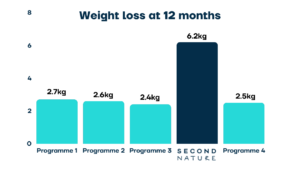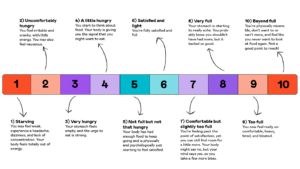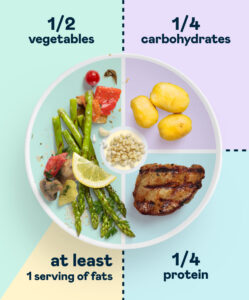A healthy diet seems simple in theory, but putting it into practice is more challenging.
The modern Western environment is constantly pushing us to consume more. Ultra-processed foods are easily accessible and delicious and are engineered in a way to make us eat more.
The Second Nature approach is based on human clinical trials that have shown specific dietary patterns can help to lower your hunger and desire for ultra-processed foods and sugar.
Lower-carbohydrate diets based on whole foods are high in protein, fibre from many plant foods, and healthy fats.
The balance of lower-carb diets naturally suppresses our body’s hunger hormone, which we call ghrelin, and increases our body’s appetite-suppressing hormones (known as satiety hormones).
Nutrition can be essential in managing our psychological desire for ultra-processed foods rich in sugar.
Your body will function much better with improved nutrition, and you’ll start to crave junk foods less; you may also notice a change in your taste.
However, nutrition is only one piece of a giant puzzle and to sustain these changes – you also need to focus on your mindset.
2) Mindset
The primary psychological factors determining weight loss maintenance are complex.
As you may have gathered from the list in our introduction, there’s a long list of psychological changes observed in individuals who lose weight and keep it off.
Underlying all psychological barriers to weight loss is the setting within the brain that is biassed toward negative thinking.
Psychologists believe we’re wired to think and focus on the negatives as a protective mechanism.
If you imagine our hunter-gatherer ancestors in the wild, not being top of the food chain living in a very dangerous world – our brain’s ability to hone in on the potential negatives of every situation added caution to increase survival chances.
Now you know this; you can use it to your advantage as you train your brain to respond to these negative thoughts more constructively and extract more from difficult situations.
The goal is not to eliminate negative thoughts; this is impossible. The goal is to learn how to respond to them in a way, so they don’t own you and dictate your mood and emotions.
You might be thinking: ‘how will all of this help me lose weight?’. We’ve spent the last decade researching and supporting people to lose weight and keep it off, so you can trust us: your psychology will determine your weight loss success.
So, let’s look at three areas of psychology that will help you lose weight and keep it off.
1 – Acceptance
As we’ve discussed with negative thoughts above, the goal of improving your mindset isn’t to eliminate negative thoughts.
You need to be comfortable knowing that negative thoughts will always be there. Your inner critic will always have a voice telling you you’re not good enough and that you can’t achieve anything.
But it’s about learning to respond to these thoughts in a way that allows you to take ownership of your emotional state and mood.
We’ll cover some techniques to do this in the next section, but be reassured that it’s completely normal to experience negative thoughts.
We’re often told to just ‘think positive’. The problem is that it sets an expectation that we should never experience negative thoughts or emotions.
Learning to accept difficult emotions
It’s normal to experience sadness, loneliness, boredom, and stress; we don’t always have to try and suppress and escape those emotions.
Imagine you’ve gone through a breakup or lost someone close to you, and you feel sad about this. Should we try to suppress this emotion? Or should we accept that these emotions are normal and part of the grieving process?
So, the next time you feel sad, low, angry, or lonely – understand that this is entirely normal, and it’s OK to sit with it.
This doesn’t mean you need to be dictated by these emotions and let them determine your behaviour – but it adds a layer of self-compassion to your thought processes. It might allow more capacity for healthy habits like cooking or exercising.
2 – Responding to your thought biases
Thought biases are the immediate negative thoughts that often come to mind when you’re in a difficult situation.
A typical example of a thought bias is all-or-nothing thinking. Also known as black-and-white thinking, all-or-nothing thinking can have a negative impact on your ability to reach your goals in life, particularly your weight loss goals.
Here are a few common examples of the all-or-nothing mindset you might have experienced during a weight loss attempt:
- ‘I’ve had one chocolate; I might as well have the whole box’
- ‘I’ve had one “bad” food, the whole day’s ruined’
- ‘I’ve fallen off the wagon; I might as well give up’
Remember, these thoughts are normal. It’s how we respond to them that matters, and we can respond proactively in two steps:
- Labelling a thought bias
- Reframing it
Let’s use an example. You’ve gone out for dinner with your friends and didn’t want to have a pudding, but you had a chocolate brownie.
Because you’ve labelled chocolate a ‘bad’ food, your immediate reaction is to think, ‘I’m a complete failure, I shouldn’t have had that dessert, and I might as well give up’.
The first thing you can do is label that as a thought bias and try and reframe the thought to be more helpful to you.
So, you could think, ‘that’s a thought bias; I’m not a failure, I’ve been cooking healthy meals all week, and one dessert doesn’t determine my health – I enjoyed having it with my friends’.
Like learning any new skill, responding to your thought biases in a helpful way takes time and practice.
3 – Finding your intrinsic (internal) motivations to lose weight
Motivation can be broadly split into two categories:
- Extrinsic (external)
Intrinsic (internal)
Extrinsic motivations are things like how you look or money. In contrast, intrinsic motivations are your health, family, or independence.
Research has suggested that extrinsic motivation can provide short-term motivation and play a role in weight loss. However, intrinsic motivation plays a much more significant role in determining weight loss success in the long term.
How can you find your intrinsic motivation?
It can help to complete a values activity to define what’s important to you and why. You might think this all sounds fluffy, which is normal.
But we can assure you that this isn’t fluff; it’s psychology and will play a huge role in determining your weight loss success.
Complete the following exercise to help you identify your values:
Step 1) Name a time that you were truly happy…
For example, “When I was hiking in the Lake District with my family.”
Step 2) What was it about that time that made you so happy?
For example, “I was spending time with my family, away from distraction and stress, and being out in nature.”
Step 3) Identify values from step 2
For example, this individual values:
- Family
- Balance
- Nature
- Adventure
From these values, you can then allow these to guide and motivate your actions.
Let’s say you’re planning a run at lunchtime, but it starts raining. Your motivation dips as you visualise a cold, wet, soggy run through the countryside. An hour in front of the TV sounds more comfortable.
But then you consider your values. You value a sense of adventure, you value being outside in nature, and you value finding balance in your day. So, running in the countryside is the perfect way to align your values.
It’s this that will drive you to keep going.
Key points:
- Changing your eating habits is probably enough to lose weight in the short term.
- You need to change your mindset to maintain your weight loss in the long term.
- Acceptance, responding to your thought biases, and identifying your intrinsic motivations are three key psychological factors determining your weight loss success.
3) Movement
The research on this topic is clear. Individuals who are more physically active tend to have a better chance of keeping off the weight they lose.
There are a few reasons why:
- Exercise boosts our mood, improves our stress response, and gives us more confidence.
- Exercise can increase your energy expenditure by a modest amount.
- Exercise improves your body’s ability to respond to hormones that help you feel fuller for longer; we call these your satiety hormones.
- Exercise seems to help your body align to a new fat percentage ‘set-point’.
So, there are multiple psychological and physiological reasons why exercise can help you maintain weight loss in the long term.
But maintaining an exercise habit is a highly challenging task for many people, so how can you do it?
Here are our top tips for starting and maintaining an exercise routine:
- Find something you enjoy. What physical activity have you done in the past that you’ve enjoyed? Or is there something you’ve always wanted to try?
- Start small. You’re not going to go from the sofa to a marathon in a week; take small steps and set realistic goals like: I’m going to go for a walk for 5 minutes every morning when I wake up. This may sound too small to have an effect, but you’re setting yourself up for success, and it will create success momentum.
- Link it to your values and intrinsic motivation. There will be days when your motivation to move and exercise will be low, and that’s OK. If you need the inspiration to go on days you don’t feel like it, reflect on your internal values and why exercise and movement are essential.
- Make it social. Research suggests that individuals are more likely to maintain an exercise habit if there’s a social element. This could be tennis, badminton, a local 5-a-side football team, a dance class, or your local walking group. Whatever it is, the added social aspect will increase your chances of success and enjoyment.
- Sign up for a challenge. Many people find challenges are the perfect way to kickstart their exercise routine. The NHS couch to 5k is a perfect example of this. Once you’ve completed a challenge, it’s essential to reflect on what it’s taught you. If you can achieve that, what else could you achieve?
Key points:
- Regular physical activity can improve the chances of maintaining weight loss.
- Exercise can boost mood, improve stress response, and increase confidence.
- Exercise can increase energy expenditure and improve the body’s response to satiety hormones.
- Maintaining an exercise habit can be challenging, but there are ways to increase the chances of success:
-
- Finding an enjoyable activity
- Starting small and setting realistic goals
- Linking exercise to personal values and motivation
- Making exercise social
- Signing up for a challenge
Take home message
Losing weight and keeping it off might be one of the most difficult challenges you will ever take on.
The success rate of weight loss maintenance is so low that researchers and public health experts are often at a loss as to what to suggest to help solve the problem.
However, every big challenge starts with small actions and our ability to be present and focus on the here and now.
There’s a theory known as the goal-gradient hypothesis whereby the closer we are to achieving our goals, the more likely we will work harder to obtain them.
Think about runners at the end of a marathon or office workers in the final months of the year pushing for their Christmas bonus.
If you can leverage this and focus on small, realistic daily actions that are health-promoting – you’ll start to feel a sense of accomplishment and build up success momentum.
“A journey of a thousand miles begins with a single step.”
– Lao Tzu
Click here to join over 3,000 monthly visitors to our NHS-trusted meal plan and try the Second Nature approach for free for seven days.






